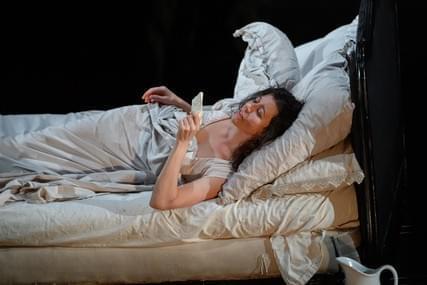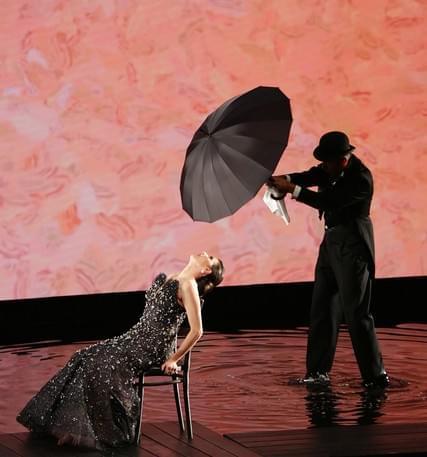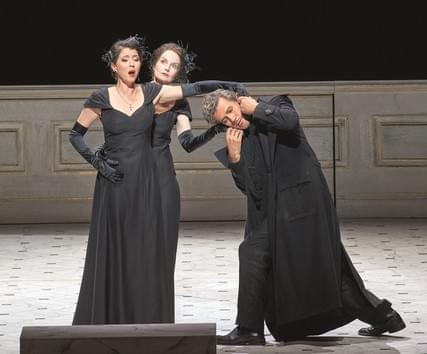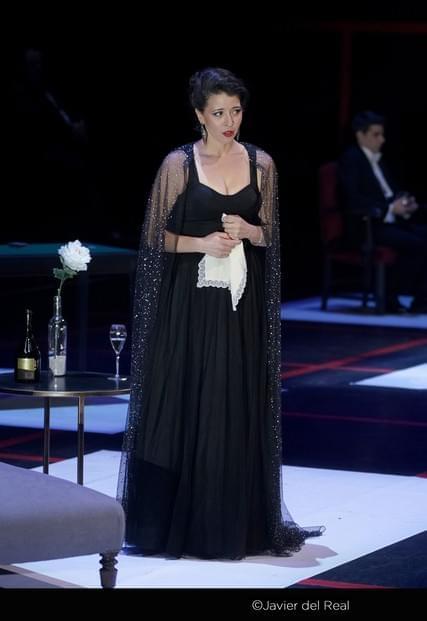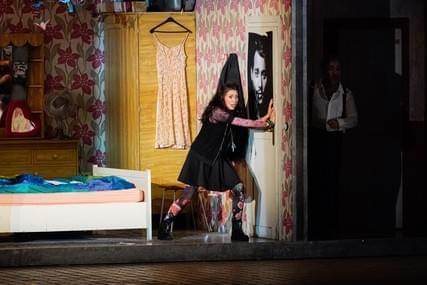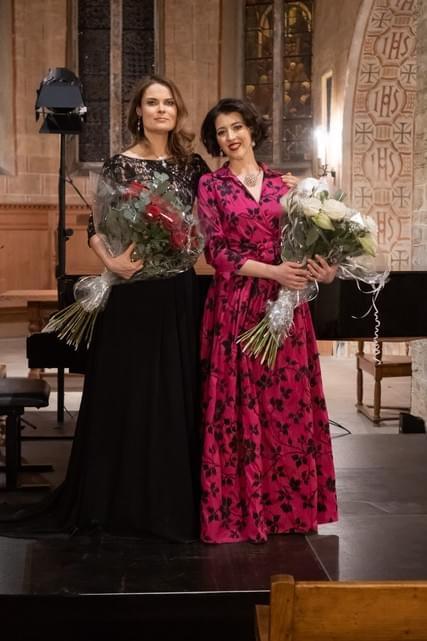2020
Gran Theatre del Liceu - La traviata
Nov, 2020 - Dec, 2020Brava Oropesa!
Lugar y fecha: Gran Teatre del Liceu (15/XII/2020) Seductora y carismática, así fue la Violetta Valéry de la estadounidense Lisette Oropesa, éxito personal y ovación en el Liceu. Recuperadas las funciones de La Traviata tras ampliar el tope de 500 espectadores a 1.000, faltaba disfrutar de la tercera de las cuatro Violetta en discordia, vistas ya Kristina Mkhitaryan y Pretty Yende, y a falta de Ermonela Jaho en la última función. Lisette, la más ligera, sorprendió, pues más allá de un primer acto brillante, donde desplegó su instrumento a piacere, Mi bemol al nal del “Sempre libera!” , agudos fáciles, luminosos y timbrados, creció con el desarrollo de la partitura. En su dúo con Germont padre coloreó, buscó expresión y matices, siempre sul ato, con un fraseo detallado, articulando cada frase con una escuela belcantista de primera. En su aria nal “Addio del passato” , la más aplaudida, controló el vibrato, aportó drama y acabó con un pianissimo volátil inolvidable. Brava la Oropesa!Place and date: Gran Teatre del Liceu (December 15, 2020) Seductive and charismatic, this was the Violetta Valéry of American Lisette Oropesa, a personal triumph and ovation at the Liceu. With the revival of La Traviata performances after the audience limit was extended from 500 to 1,000, it was time to enjoy the third of the four Violettas at odds, having already seen Kristina Mkhitaryan and Pretty Yende, and with only Ermonela Jaho left for the final performance. Lisette, the lightest of them, was a surprise, as beyond a brilliant first act, where she displayed her instrument at pleasure, E-flat at the end of the "Sempre libera!", easy, bright, and well-timbred high notes, she grew with the unfolding of the score. In her duet with Germont senior, she added color, sought expression and nuances, always sul A (on the A string), with detailed phrasing, articulating each phrase with top bel canto technique. In her final aria "Addio del passato", the most applauded, she controlled the vibrato, delivered drama, and finished with a memorable volatile pianissimo. Brava Oropesa!— Jordi Maddaleno • La VanguardiaTeatro alla Scala - Concert
Dec, 2020La Scala’s online gala is a triumph
Donizetti’s Lucia di Lammermoor is usually found in gloomy Scotland, not paddling on a sun-soaked beach, but the brilliant-voiced Lisette Oropesa thrived there anyway.None— Richard Fairman • Financial TimesWiener Staatsoper - Die Entführung aus dem Serail
Sep, 2020 - Oct, 2020Staatsoper: Wien hält auch Hans Neuenfels aus
Strahlender Star des Abends: die US-Sopranistin Lisette Oropesa, die bei ihrem Staatsoperndebüt als Konstanze ausnahmslos alle im Publikum überzeugte.Radiant star of the evening: the US soprano Lisette Oropesa, who, in her debut at the State Opera as Konstanze, convinced everyone in the audience without exception.— heid • ORF.ATRoyal Opera House - Live in Concert
Sep, 2020Getting the band back together: Pappano leads The Royal Opera's return to action
Vocally, these two delivered outstanding contributions. Oropesa’s technique is superb. She is the reigning bel canto queen in my book and the finale from La sonnambula was perfectly pitched, crowned by a sparkling “Ah! non giunge”.None— Mark Pullinger • BachtrackArena di Verona - Rossini Gala
Aug, 2020Il Rossini Gala dell’Arena di Verona
Excellent interpretations by all the interpreters involved. Lisette Oropesa confirms herself as a singer perfectly at ease in the bel canto repertoire, as well as able to immerse herself in the different characters she has to face in a few minutes, although so different from each other (Semiramide and Rosina in the Barbiere in the first part of the concert).None— blogartpost • The.blogartpostTeatro Real - La traviata
Jul, 2020Llegó Lisette Oropesa y ‘dio el canto’ en ‘La Traviata’ (y el Teatro Real se vino abajo)
Now, in the final stretch, Lisette Oropesa arrives. You have to go see it, and especially to listen to it. Even if it is only for the few seconds in which her Amami Alfredo transports us to the great ones that we all have engraved in our brain, which is the best hard drive that can exist. It is true that we are in need of beautiful things. And it is no less true that the Oropesa gives us the ear. When we still remember his Lucia from two years ago (and his Gilda del Rigoletto from 2015), now comes his Violetta, which enshrines her in the Real: from chaste diva, chaste goddess, to absolute diva. But with the closeness that the divas of the 21st century require. Her elegance on stage, in addition, adds many points. El Real, we insist, is at fifty percent capacity for health reasons. Those who were on July 18 filled all the gaps with applause; a welcome that makes history. The shadow of the encore flew over the room after his sublime Addio del passato of the final act. Just as the illusion that he would come out to be applauded behind the curtain that closed the first one also flew overhead. As before, as could be done when the voice prevailed.None— Nacho Fresno • ShangayTeatro del Maggio Musicale Fiorentino - At Home Gala
May, 2020The Top 5 Moments From the Maggio Musicale Fiorentino’s At Home Gala
In an outstanding rendition of Douglass Moore’s aria “Willow,” Oropesa offered audiences a refined and moving performance filled with crystal clear high notes, all sung a capella. While the performance was pre-recorded, Oropesa also recited the text for Italian audiences in a beautiful and moving reading.None— Francisco Salazar • Opera WireMetropolitan Opera - Livestream Gala
Apr, 2020The Met At-Home Gala review: a galaxy of opera stars 'phone in' for a glitchy but uplifting concert
at the soprano end of the scale, Lisette Oropesa twittered very prettily through En vain j’espère from Meyerbeer’s Robert le Diable.None— Rupert Christiansen • The TelegraphMetropolitan Opera - La Traviata
Feb, 2020 - Mar, 2020Oropesa is an unforgettable Violetta in Met’s “Traviata” revival
There’s a melancholy feeling that very occasionally accompanies the greatest performances. Tangled up in the thrill of witnessing a historic interpretation of an iconic work comes the sad realization that you may never encounter its equal. The Metropolitan Opera has seen a number of superb sopranos appear as Violetta Valéry in the past decade: Diana Damrau, Natalie Dessay, Sonya Yoncheva, and Angelina Gheorghiu are just a handful of the most recent leading artists to make a mark in La Traviata’s touchstone role. The sensational performance that Lisette Oropesa gave on Wednesday night in her role debut at the Met deserves to be counted in the very first rank. Oropesa brings a voice ideally suited to the role: direct and lively, bright yet round, so focused you can almost see it as it pierces through the air of the auditorium and slams into the back wall. Yet even with its power and laser clarity, her soprano never feels aggressive, as she wields her instrument with musical sensitivity and classic elegance.None— Eric C. Simpson • New York Classical ReviewMetropolitan Opera - National Council Grand Finals Concert
Mar, 2020Hamlen-Palm Series - Concert
Mar, 2020Opéra national de Paris - Il Barbiere di Siviglia
Dec, 2019 - Feb, 2020Jeunes et prometteurs
Appréciée du public parisien depuis sa Marguerite de Valois dans Les Huguenots à l’automne 2018, Lisette Oropesa compose une Rosine en tout point captivante. La jeune soprano ne manque ni de piquant ni de charme. La voix est brillante, l’aigu aisé, les vocalises sont parfaitement exécutées et la ligne de chant ornementée avec subtilité. Actrice accomplie, elle évolue comme un poisson dans l’eau dans l’univers imaginé par Michieletto.Lisette Oropesa has been admired by the Parisian audience since her performance as Marguerite de Valois in Les Huguenots in the fall of 2018, she delivers an utterly captivating Rosina. The young soprano lacks neither spiciness nor charm. Her voice is brilliant, the high notes are easy, the vocalizations are perfectly executed and the singing line is subtly ornamented. An accomplished actress, she moves like a fish in water in the universe imagined by Michieletto.— Christian Peter • Forum OperaGstaad New Year Music Festival - Recital
Jan, 2020Gstaad in majesty
One of the highlights of the 2019-2020 edition of the Gstaad New Year Music Festival was the recital of the American soprano Lisette Oropesa. In rehearsal in Paris for Le Barbier de Seville, the singer did not hesitate to make a quick return trip to Gstaad, despite the strikes in France and their batch of trains canceled, to offer a memorable evening. The program was particularly varied and eclectic, alternating opera arias and lieder, in four different languages. Unmistakable charisma, clear and luminous voice, ample and majestic, healthy and homogeneous over the whole range, with brilliant treble and perfectly assured vocalizations, Lisette Oropesa has everything to make a good career, and besides the biggest scenes are l 'tear. In Gstaad, she was especially able to highlight her musicality, her impeccable diction, whatever the language sung, and its sense of expressiveness, playing on each word, each sentence, each inflection of the score, whether in melancholy and sad compositions or in flamboyant and brilliant pages. She was accompanied on the piano with finesse and tact by Natalia Morozova, a follower of Gstaad since she has been performing there for ten years.None— Claudio Poloni • Concerto Net

